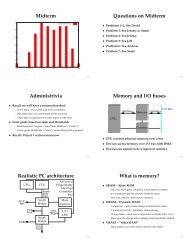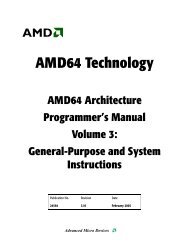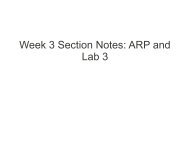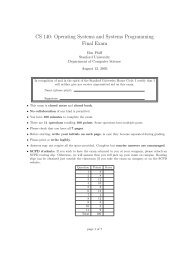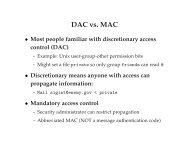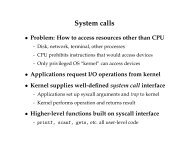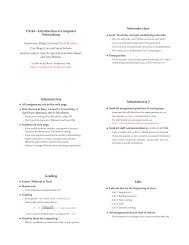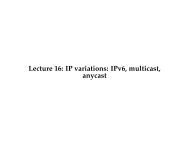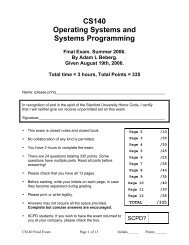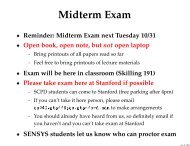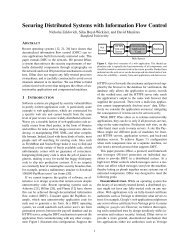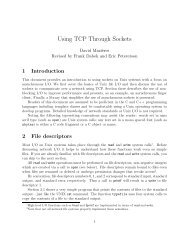NFS version 3 - Stanford Secure Computer Systems Group
NFS version 3 - Stanford Secure Computer Systems Group
NFS version 3 - Stanford Secure Computer Systems Group
You also want an ePaper? Increase the reach of your titles
YUMPU automatically turns print PDFs into web optimized ePapers that Google loves.
<strong>NFS</strong> <strong>version</strong> 3<br />
• Same general architecture as <strong>NFS</strong> 2<br />
• New access RPC<br />
- Supports clients and servers with different uids/gids<br />
• Better support for caching<br />
- Unstable writes while data still cached at client<br />
- More information for cache consistency<br />
• Better support for exclusive file creation
struct nfs_fh3 {<br />
opaque data;<br />
};<br />
File handles<br />
• Server assigns an opaque file handle to each file<br />
- Client obtains first file handle out-of-band (mount protocol)<br />
- File handle hard to guess – security enforced at mount time<br />
- Subsequent file handles obtained through lookups<br />
• File handle internally specifies file system / file<br />
- Device number, i-number, generation number, . . .<br />
- Generation number changes when inode recycled
File attributes<br />
struct fattr3 { specdata3 rdev;<br />
ftype3 type;<br />
uint64 fsid;<br />
uint32 mode;<br />
uint64 fileid;<br />
uint32 nlink; nfstime3 atime;<br />
uint32 uid;<br />
nfstime3 mtime;<br />
uint32 gid;<br />
nfstime3 ctime;<br />
uint64 size; };<br />
uint64 used;<br />
• Most operations can optionally return fattr3<br />
• Attributes used for cache-consistency
Lookup<br />
struct diropargs3 { struct lookup3resok {<br />
nfs_fh3 dir;<br />
nfs_fh3 object;<br />
filename3 name;<br />
post_op_attr obj_attributes;<br />
}; post_op_attr dir_attributes;<br />
};<br />
union lookup3res switch (nfsstat3 status) {<br />
case <strong>NFS</strong>3_OK:<br />
lookup3resok resok;<br />
default:<br />
post_op_attr resfail;<br />
};<br />
• Maps 〈directory, handle〉 → handle<br />
- Client walks hierarch one file at a time<br />
- No symlinks or file system boundaries crossed
Create<br />
struct create3args { union createhow3 switch (createmode3 mode) {<br />
diropargs3 where; case UNCHECKED:<br />
createhow3 how; case GUARDED:<br />
}; sattr3 obj_attributes;<br />
case EXCLUSIVE:<br />
createverf3 verf;<br />
};<br />
• UNCHECKED – succeed if file exists<br />
• GUARDED – fail if file exists<br />
• EXCLUSIVE – persistent record of create
Read<br />
struct read3args { struct read3resok {<br />
nfs_fh3 file;<br />
post_op_attr file_attributes;<br />
uint64 offset; uint32 count;<br />
uint32 count;<br />
bool eof;<br />
}; opaque data;<br />
};<br />
union read3res switch (nfsstat3 status) {<br />
case <strong>NFS</strong>3_OK:<br />
read3resok resok;<br />
default:<br />
post_op_attr resfail;<br />
};<br />
• Offset explicitly specified (not implicit in handle)<br />
• Client can cache result
Data caching<br />
• Client can cache blocks of data read and written<br />
• Consistency based on times in fattr3<br />
- mtime: Time of last modification to file<br />
- ctime: Time of last change to inode<br />
(Changed by explicitly setting mtime, increasing size of file,<br />
changing permissions, etc.)<br />
• Algorithm: If mtime or ctime changed by another<br />
client, flush cached file blocks
Write discussion<br />
• When is it okay to lose data after a crash?<br />
- Local file system<br />
- Network file system<br />
• <strong>NFS</strong>2 servers flush writes to disk before returning<br />
• Can <strong>NFS</strong>2 perform write-behind?<br />
- Implementation issues<br />
- Issues of semantics<br />
• Can <strong>NFS</strong>2 keep cached files after writing them?
<strong>NFS</strong>3 Write arguments<br />
struct write3args { enum stable_how {<br />
nfs_fh3 file; UNSTABLE = 0,<br />
uint64 offset; DATA_SYNC = 1,<br />
uint32 count; FILE_SYNC = 2<br />
stable_how stable; };<br />
opaque data;<br />
};
Write results<br />
struct write3resok { struct wcc_attr {<br />
wcc_data file_wcc;<br />
uint64 size;<br />
uint32 count;<br />
nfstime3 mtime;<br />
stable_how committed;<br />
nfstime3 ctime;<br />
writeverf3 verf; };<br />
}; struct wcc_data {<br />
wcc_attr *before;<br />
post_op_attr after;<br />
};<br />
union write3res switch (nfsstat3 status) {<br />
case <strong>NFS</strong>3_OK:<br />
write3resok resok;<br />
default:<br />
wcc_data resfail;<br />
};
Data caching after a write<br />
• Write will change mtime/ctime of a file<br />
- “after” will contain new times<br />
- Should cause cache to be flushed<br />
• “before” contains previous values<br />
- If before matches cached values, no other client has<br />
changed file<br />
- Okay to update attributes without flushing data cache
Write stability<br />
• Server write must be at least as stable as requested<br />
• If server returns write UNSTABLE<br />
- Means permissions okay, enough free disk space, . . .<br />
- But data not on disk and might disappear (after crash)<br />
• If DATA SYNC, data on disk, maybe not attributes<br />
• If FILE SYNC, operation complete and stable
Commit operation<br />
• Client cannot discard any UNSTABLE write<br />
- If server crashes, data will be lost<br />
• COMMIT RPC commits a range of a file to disk<br />
- Invoked by client when client cleaning buffer cache<br />
- Invoked by client when user closes/flushes a file<br />
• How does client know if server crashed?<br />
- Write and commit return writeverf3<br />
- Value changes after each server crash (may be boot time)<br />
- Client must resend all writes if verf value changes
Attribute caching<br />
• Close-to-open consistency<br />
- It really sucks if writes not visible after a file close<br />
(Edit file, compile on another machine, get old <strong>version</strong>)<br />
- Nowadays, all <strong>NFS</strong> opens fetch attributes from server<br />
• Still, lots of other need for attributes (e.g., ls -al)<br />
• Attributes cached between 5 and 60 seconds<br />
- Files recently changed more likely to change again<br />
- Do weighted cache expiration based on age of file<br />
• Drawbacks:<br />
- Must pay for round-trip to server on every file open<br />
- Can get stale info when statting a file
User-level file systems<br />
• Developing new file systems is a difficult task<br />
- Most file systems implemented in the kernel<br />
- Debugging harder, crash/reboot cycle longer<br />
- Complicated kernel-internal API (VFS layer)<br />
• File systems are not portable<br />
- Kernel VFS layer differs significantly between OS <strong>version</strong>s<br />
• <strong>NFS</strong> can solve these problems. . .<br />
- C++ toolkit greatly simplifies the use of <strong>NFS</strong>
<strong>NFS</strong> overview<br />
Application<br />
user<br />
kernel<br />
system<br />
call<br />
VFS<br />
<strong>NFS</strong><br />
client<br />
UDP<br />
File<br />
Server<br />
• <strong>NFS</strong> is available for almost all Unixes<br />
• Translates file system accesses into network RPCs<br />
- Hides complex, non-portable VFS interface
Old idea: <strong>NFS</strong> loopback servers<br />
Application<br />
user<br />
kernel<br />
system<br />
call<br />
VFS<br />
<strong>NFS</strong><br />
loopback<br />
server<br />
<strong>NFS</strong><br />
client<br />
UDP<br />
• Implement FS as an <strong>NFS</strong> server in a local process<br />
• Requires only portable, user-level networking<br />
- File system will run on any OS with <strong>NFS</strong> support
Problem: Performance<br />
• Context switches add latency to <strong>NFS</strong> RPCs<br />
• Must service <strong>NFS</strong> RPCs in parallel<br />
- Overlap latencies associated with handling requests<br />
- Keep disk queue full for good disk arm scheduling<br />
• If loopback server blocks, so do other processes<br />
- E.g., loopback for /loop blocks on a TCP connect<br />
- getcwd() and “ls -al /” will block, even outside of /loop<br />
• One slow file can spoil the whole file system a<br />
- If one RPC times out, client decides server is down<br />
- Client holds other RPCs to avoid flooding server<br />
- Example: Alex FTP file server<br />
a <strong>NFS</strong>3ERR JUKEBOX can help, but has problems
Problem: Any file I/O can cause deadlock<br />
user<br />
kernel<br />
read<br />
<strong>NFS</strong><br />
loopback<br />
server<br />
1<br />
4<br />
<strong>NFS</strong><br />
client<br />
3<br />
buffer<br />
cache<br />
VFS<br />
FFS<br />
2<br />
1. Loopback server reads file on local disk<br />
2. FFS needs to allocate a buffer<br />
3. Kernel chooses a dirty <strong>NFS</strong> buffer to recycle<br />
4. Blocks waiting for reply to write RPC
Problem: Development and debugging<br />
• Bugs must be mapped onto <strong>NFS</strong> RPCs<br />
- Application make system calls<br />
- Not always obvious what RPCs the <strong>NFS</strong> client will generate<br />
- Bug may actually be in kernel’s <strong>NFS</strong> client<br />
• When loopback servers crash, they hang machines!<br />
- Processes accessing the file system hang, piling up<br />
- Even umount command accesses the file system and hangs<br />
• Repetitive code is very error-prone<br />
- Often want to do something for all 20 <strong>NFS</strong> RPC procedures<br />
(e.g., encrypt all <strong>NFS</strong> file handles)<br />
- Traditionally requires similar code in 20 places
SFS toolkit<br />
• Goal: Easy construction of loopback file systems<br />
• Support complex programs that never block<br />
- Service new <strong>NFS</strong> RPCs while others are pending<br />
• Support multiple mount points<br />
- Loopback server emulates multiple <strong>NFS</strong> servers<br />
- One slow mount point doesn’t hurt performance of others<br />
• Simplify task of developing/debugging servers<br />
- nfsmounter daemon eliminates hangs after crashes<br />
- RPC library supports tracing/pretty-printing of <strong>NFS</strong> traffic<br />
- RPC compiler allows traversal of <strong>NFS</strong> call/reply structures
nfsmounter daemon<br />
• nfsmounter mounts <strong>NFS</strong> loopback servers<br />
- Handles OS-specific details of creating <strong>NFS</strong> mount points<br />
- Eliminates hung machines after loopback server crashes<br />
• To create an <strong>NFS</strong> mount point, loopback server:<br />
- Allocates a network socket to use for <strong>NFS</strong><br />
- Connects to nfsmounter daemon<br />
- Passes nfsmounter a copy of the <strong>NFS</strong> socket<br />
• If loopback server crashes:<br />
- nfsmounter takes over <strong>NFS</strong> socket<br />
- Prevents processes accessing file system from blocking<br />
- Serves enough of file system to unmount it
Asynchronous I/O and RPC libraries<br />
• Never wait for I/O or RPC calls to complete<br />
- Functions launching I/O must return before I/O completes<br />
- Bundle up state to resume execution at event completion<br />
• Such event-driven programming hard in C/C++<br />
- Cumbersome to bundle up state in explicit structures<br />
- Often unclear who must free allocated memory when<br />
• Alleviated by two C++ template hacks<br />
- wrap—function currying: bundles function of arbitrary<br />
signature with initial arguments<br />
- Reference counted garbage collection for any type:<br />
ptr tp = new refcounted (/* ... */);
pcc: A new RPC compiler for C++<br />
• Compiles RFC1832 XDR types to C++ structures<br />
• Produces generic code to traverse data structures<br />
- RPC marshaling only one possible application<br />
• Can specialize traversal to process particular types<br />
- Encrypt/decrypt all <strong>NFS</strong> file handles for security<br />
- Extract all file attributes for enhanced caching<br />
• Outputs pretty-printing code<br />
- Environment variable makes library print all RPC traffic<br />
- Invaluable for debugging strange behavior
Stackable <strong>NFS</strong> manipulators<br />
• Often want to reuse/compose <strong>NFS</strong> processing code<br />
• SFS toolkit provides stackable <strong>NFS</strong> manipulators<br />
- <strong>NFS</strong> server objects generate <strong>NFS</strong> calls<br />
- Most loopback servers begin with nfsserv udp<br />
- Manipulators are servers constructed from other servers<br />
• Example uses:<br />
- nfsserv fixup—works around bugs in <strong>NFS</strong> clients<br />
- nfsdemux—demultiplex requests for multiple mount points
Creating new mountpoints<br />
• Hard to create mountpoints in-place and on-the-fly<br />
- If user looks up /home/u1, must reply before mounting<br />
- Previous loopback servers use links: /home/u1→/a/srv/u1<br />
• SFS automounter mounts in place with two tricks<br />
- nfsmounter has special gid, differentiating its <strong>NFS</strong> RPCs<br />
- SFS dedicates “wait” mountpoints under .mnt/{0,1,...}<br />
• Idea: Show different files to users and nfsmounter<br />
- User sees /home/u1 as symlink u1→.mnt/0/0<br />
- .mnt/0/0 is symlink that hangs when read<br />
- nfsmounter sees /home/u1 as directory, can mount there<br />
- When mount complete, .mnt/0/0→/home/u1
Limitations of loopback servers<br />
• No file close information<br />
- Often, FS implementor wants to know when a file is closed<br />
(e.g., for close-to-open consistency of shared files)<br />
- Approximate “close simulator” exists as <strong>NFS</strong> manipulator<br />
- <strong>NFS</strong> <strong>version</strong> 4 will include closes<br />
• Can never delay <strong>NFS</strong> writes for local file system<br />
- E.g., CODA-like cache hard to implement
Application: DumbFS<br />
Application<br />
user<br />
kernel<br />
system<br />
call<br />
VFS<br />
dumbfs<br />
<strong>NFS</strong><br />
client<br />
UDP<br />
File<br />
Server<br />
• Simplest loopback server—just forwards requests<br />
- 119 lines of code, no cleanup code needed!<br />
• Isolates performance impact of toolkit
DumbFS <strong>NFS</strong> RPC forwarding<br />
void dispatch (nfscall *nc)<br />
{ // ...<br />
nfsc->call (nc->proc (), nc->getvoidarg (),<br />
nc->getvoidres (), wrap (reply, nc) /* ... */);<br />
}<br />
static void reply (nfscall *nc, enum clnt_stat stat)<br />
{<br />
if (stat == RPC_SUCCESS) nc->reply (nc->getvoidres ());<br />
else // ...<br />
}<br />
• Single dispatch routine for all <strong>NFS</strong> procedures<br />
• RPCs to remote <strong>NFS</strong> server made asynchronously<br />
- dispatch returns before reply invoked
DumbFS performance<br />
µsec<br />
300<br />
200<br />
100<br />
MBytes/sec<br />
10<br />
5<br />
seconds<br />
300<br />
200<br />
100<br />
<strong>NFS</strong><br />
DumbFS<br />
0<br />
Latency<br />
0<br />
Throughput<br />
0<br />
Compile
Application: CryptFS<br />
• Acts as both <strong>NFS</strong> server and client (like DumbFS)<br />
- Almost 1–1 mapping between <strong>NFS</strong> calls recevied and sent<br />
. . . encrypt/decrypt file names and data before relaying<br />
- Bare bones “encrypting DumbFS”
Emacs compile<br />
Execution Time (seconds)<br />
300<br />
200<br />
100<br />
0<br />
Local<br />
<strong>NFS</strong>3<br />
cryptfs<br />
CFS-async<br />
CFS-sync<br />
dumbfs
Conclusions<br />
• <strong>NFS</strong> allows portable, user-level file systems<br />
- Translates non-portable VFS interface to standard protocol<br />
• In practice, loopback servers have had problems<br />
- Low performance, blocked processes, deadlock, debugging<br />
difficulties, redundant, error-prone code,. . .<br />
• SFS toolkit makes most problems easy to avoid<br />
- nfsmounter eliminates hangs after crashes<br />
- libasync supports complex programs that never block<br />
- rpcc allows concise manipulation of 20 call/return types<br />
- Stackable manipulators provide reusable <strong>NFS</strong> processing



